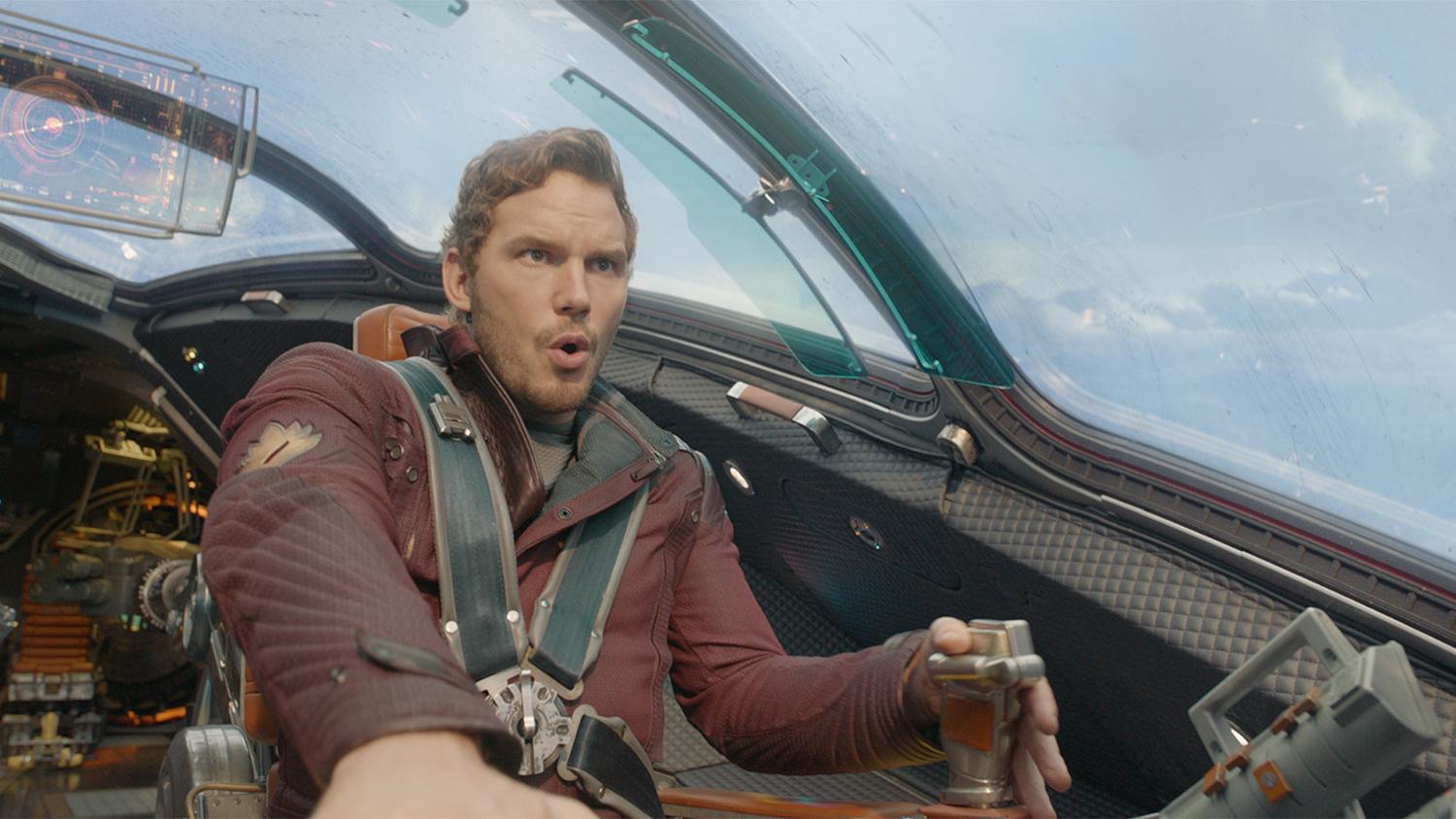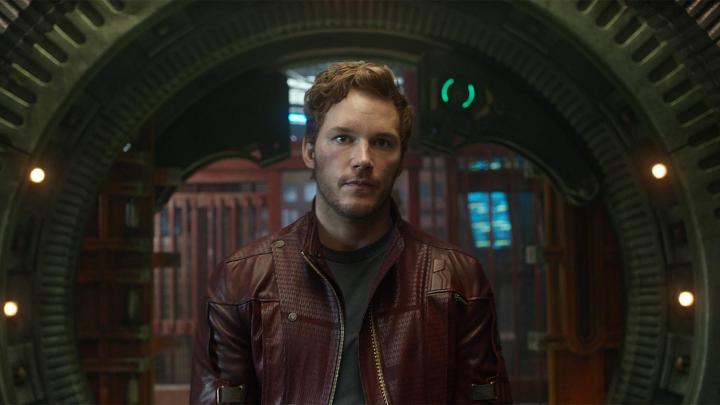Before we turn our gaze to the stars, we must discuss Earth.
It’s the birthplace of Peter Quill (Chris Pratt), the hero at the heart of Guardians of the Galaxy, Marvel Studios’ 10th film that takes place in its cohesive cinematic universe, and easily its most out-of-the-box offering yet. When we meet Peter, it’s 1988, and he’s a child on the cusp of the greatest loss he’ll ever face. When the heartbreak of losing someone close to him becomes too much to bear, Peter does what every young child tends to do in the face of adversity: He runs — but not very far. Before he can flee his troubles on his own, a spaceship beams him up from the surface of his home world, changing the course of his life forever.
Twenty-six years later, Peter’s an intergalactic outlaw known to some (but not many) as “Star-Lord.” His reputation isn’t impressive, but his skills are. He wears a retractable space mask that offers him protection and allows him to breathe under otherwise hostile conditions. He has jet boots that can help him bridge great distances. He wields hand-cannons that can use lethal force, and can also cripple enemies when a softer touch is needed. And he steals stuff — lots and lots of stuff — all while listening to Awesome Mix Volume 1, a collection of hits from the 1970s and 80s, and Peter’s only real connection to the planet he was born on.
The Guardians of the Galaxy very well may be a bunch of “a-holes,” but they’re our “a-holes.”
In short, Peter Quill represents the type of hero so many kids dream of becoming when they grow up. Likewise, Guardians of the Galaxy, as a whole, is the kind of movie kids will obsess over for years to come. It’s massive and inventive in its imagination and scope, taking fans who are familiar with the Marvel Universe so far outside of Earth that they could be completely forgiven if they forget they were watching a Marvel movie rather than, say, Star Wars. Really, Guardians and Peter Quill are closer cousins to Star Wars and Han Solo than Iron Man and Tony Stark; an even better comparison is Firefly and Malcolm Reynolds, because Quill is surrounded by a Serenity-esque crew of his own.
Indeed, while Quill is the focus of Guardians, he’s far from the only scoundrel in the galaxy. There’s Gamora (Zoe Saldana), the deadly assassin and adopted daughter of Thanos (Josh Brolin), the Mad Titan glimpsed in the Avengers‘ mid-credits sequence; Drax the Destroyer (Dave Bautista), the heavily tattooed muscle freak with a score to settle against the man who killed his family; and Rocket and Groot (voiced by Bradley Cooper and Vin Diesel, respectively), the gun-toting raccoon and talking tree-creature cut from the Han and Chewie cloth.
Independently, Star-Lord, Gamora, Drax, Rocket, and Groot are a bunch of “a-holes,” as they’re described so many times in the movie. Together, they’re the mother-loving Guardians of the Galaxy — still a bunch of “a-holes,” but “a-holes” with the collective ability to save the universe. They represent the idea that people from very different walks of life, with very different methods and priorities, can come together to do something amazing. And they do it all in style.
Testing the Guardians’ ability to work together for the greater good of the universe is Ronan the Accuser (Lee Pace), a Kree fanatic and terrorist who lashes out against the peace treaty forged between his people and the Nova Corps of Xandar. He intends to control the galaxy through the use of an ancient artifact — an artifact that just so happens to be in Peter Quill’s possession. Pace does his best to bring some threatening energy to an otherwise one-note role, but as with his character in the film, he’s outclassed by the sheer weirdness of our heroes.
As Star-Lord, Pratt proves why he’s transitioning into a new phases of his career as a leading man. He’s whimsical and goofy, as we already knew from his work on Parks and Rec, but he’s also soulful and expressive in an instantly relatable way; it does not hurt that he looks great without a shirt on, either. As Gamora, Saldana does what she does best these days: kick ass and take names in outer space. As Drax, Bautista flexes new muscle as an actor, with some solid emotional beats and even better moments of levity. (Drax takes everything literally; nothing goes over his head.) As Rocket and Groot, Cooper and Diesel threaten to steal the whole show, lending their voices to the weirdest characters in the film, and offering up some surprising moments of vulnerability as well.

Really, it’s these utterly bizarre yet fully realized characters that make Guardians a must-see. The story isn’t all that complicated, and it’s perhaps a little too familiar, but the world (or worlds, rather) it spills across are equally immense and awe-inspiring. The connection to the Marvel Universe is intriguing enough. But it’s the Guardians themselves, these unlikely heroes, that make this movie so special.
Perhaps Guardians lacks the emotional complexity and social commentary of Dawn of the Planet of the Apes, or even Captain America: The Winter Soldier, but it surpasses both of those blockbusters in terms of sheer fun and entertainment value — thanks to James Gunn’s witty script and wildly imaginative world, and the total weirdos who live in it. The Guardians of the Galaxy very well may be a bunch of “a-holes,” but they’re our “a-holes.” The world of cinema, and the universe at large, is all the more awesome with them in the mix.
(Media © Marvel Studios)Editors' Recommendations
- All the upcoming MCU movies we know about
- The best MCU sequels, ranked
- The 5 best 2023 movie trailers so far
- 5 sci-fi movies on Disney+ that are perfect to watch in the summer
- Where to watch Guardians of the Galaxy Vol. 3






